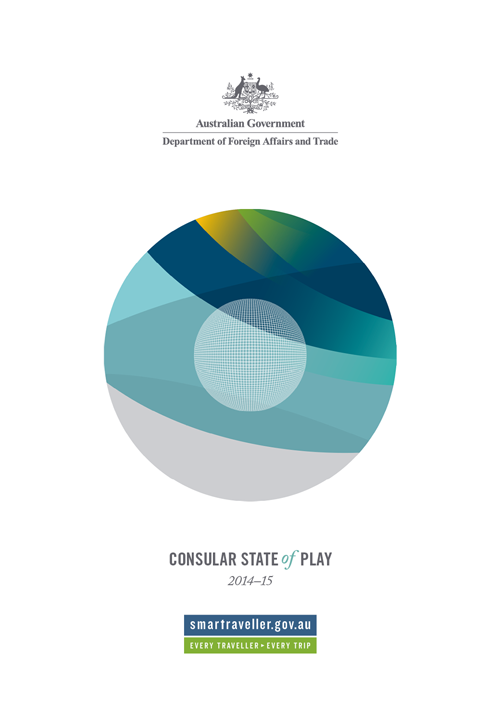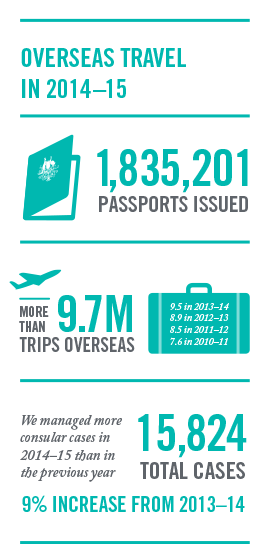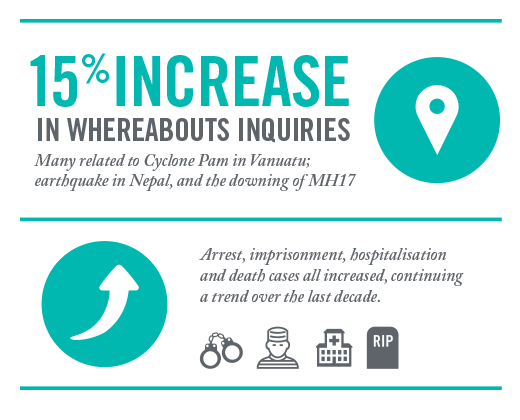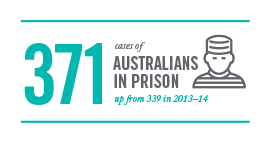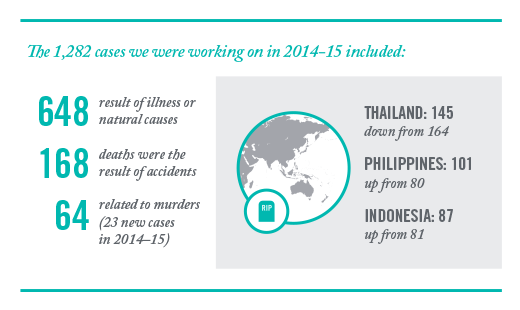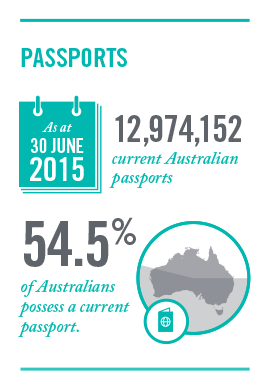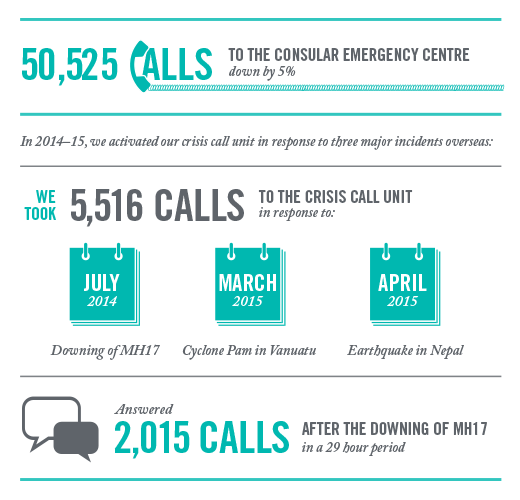When Australian officials provide assistance to an Australian who has encountered difficulties overseas – for example if they have been in an accident, have been a victim of crime, or if their friends or family in Australia are concerned about their whereabouts – this is called Consular Assistance.
We provide consular assistance and guidance in person, over the phone and online to Australians around the world. Often information and guidance is enough, as we try to help people to help themselves. In other circumstances, more is required. We always give priority to cases involving particularly vulnerable Australians, such as children, victims of violent or sexual assault or someone who is gravely ill.
To find more details on the consular services and assistance that the Department of Foreign Affairs and Trade (DFAT) provides, and what we cannot do, see the Consular Services Charter.
- Overseas travel in 2014-15
- Where are the cases happening?
- Cases of Australians arrested
- Don't carry or consume illegal drugs overseas. Ever.
- Cases of Australians in prison
- Deaths of Australians overseas
- Passports
- Mental health overseas
- Emergency financial assistance
- Calls for help
- So when should you call
- How do you know what to plan for?
- Contact us
Protecting privacy
Personal information provided to DFAT is protected by law, including the Privacy Act 1988. DFAT's privacy policy can be accessed at dfat.gov.au/privacy. Personal information may be used by us to provide consular assistance. In accordance with Australian Privacy Principle 5, information about how we collect, use, disclose and store personal information related to consular cases is contained in our Consular Privacy Collection Statement. Copies of the Statement are available online or by requesting a copy from the department.
Overseas travel in 2014-15
If you're well prepared, in most situations you can look after yourself, often through travel insurance or by using increasingly available international financial facilities, without needing to seek consular assistance.
Our case statistics are just that: they refer to the number of consular cases we are managing. When Australians run into difficulties overseas, they do not always seek consular assistance. Often they can sort things out themselves, or with the help of family, friends, travel insurers, travel agents or employers.
| 2014–15 | 2013–14 | 2012–13 | 2011–12 | 2010–11 | |
|---|---|---|---|---|---|
|
1 These figures include crisis-related whereabouts cases. |
|||||
| Arrest | 1,256 | 1,185 | 1,136 | 1,181 | 1,069 |
| Prisoner | 371 | 339 | 343 | 326 | 313 |
| Death | 1,282 | 1,215 | 1,247 | 1,138 | 1,142 |
| Hospitalisation | 1,453 | 1,330 | 1,372 | 1,265 | 1,203 |
| Whereabouts inquiries1 | 5,697 | 4,794 | 1,829 | 4,154 | 12,899 |
| Repatriation | 61 | 74 | 81 | 70 | 75 |
| Welfare | 3,053 | 2,370 | 2,224 | 2,247 | 3,034 |
| Theft | 1,066 | 1,238 | 1,225 | 1,221 | 1,075 |
| Assault | 235 | 209 | 228 | 193 | 206 |
| Other assistance | 1,350 | 1,804 | 2,242 | 2,779 | 2,739 |
| Total cases of assistance | 15,824 | 14,558 | 11,927 | 14,574 | 24,186 |
| Emergency passports | 8,171 | 7,857 | 8,020 | 7,976 | 7,909 |
When consular officials provide assistance to an Australian, they open a case in DFAT's consular information management system. Our consular statistics record how many cases we were managing over that period. Every case is different – some can be sorted out quite quickly, whereas others may stay open for weeks, months or even years.
|
Bill and Sue were on the trip of a lifetime – a cruise visiting destinations they'd always dreamed about. Two days into the cruise, Bill became unwell and had to be taken off the ship in an unscheduled port stop. The local hospital didn't have the right facilities and he was medically evacuated home for treatment. They had the right insurance so their costs – which amounted to over $100,000 – were covered and arrangements were made quickly. |
James and Indira booked their cruise around the Pacific. Their cruise sailed from Sydney and included all food and accommodation and a doctor on board. Halfway through the holiday, Indira fell and broke her hip, needing medical help beyond what the ship's doctor could provide. Thinking that they'd be looked after on the ship, they hadn't taken out travel insurance. The next island didn't have the hospital facilities needed to treat Indira, so she was transferred by helicopter to a bigger island. With bills over $90,000, James and Indira had to re-mortgage their house and ask their adult kids to help. |
Where are the cases happening?
With Thailand attracting nearly 1 million Australian visitors last year, Bangkok is consistently our busiest consular post.
- 667 cases in Thailand, down 13% from 2013-14, including
- Hospitalisation (163)
- Death (146)
- 649 cases in the USA, down 6% from 2013-14, including
- Arrest (169)
- Welfare (106)
- 609 cases in Italy, steady over recent years, including
- Welfare (351)
- Theft (90)
- 547 cases in Indonesia, up 20% from 2013-14, including
- Hospitalisation (124)
- Welfare (155)
- 484 cases in Spain, down 19% from 2013-14, including
- Hospitalisation (22)
- Theft (214)
Case numbers do not show complexity: some cases might be straightforward and quick to resolve; others may be complex and take weeks, months or even years to resolve.
Assault case numbers remained quite steady, including the number of sexual assault cases (97 in 2014–15). No one destination stands out as a place more likely for sexual assault to occur, with cases occurring all around the world – a point which we emphasise in our travel advice.
Cases of Australians arrested
The number of cases of Australians arrested overseas continues to increase, with 1,256 such cases in 2014–15, an Overall increase of 17% from 1,069 in 2010–11.
- USA 169*
- 15% down from 198 in 2013-14
- Mostly for assault, visa and drugs issues
- China (mainland) 103
- 8% down from 112 in 2013-14
- Mostly for fraud, drugs and assault issues
- Thailand 93
- 8% down from 101 in 2013-14
- Mostly for drugs, visa and theft issues
*Many of the arrest/detention cases in the USA are related to immigration offences and deportation. As our travel advice makes clear, the United States administers a strict entry regime and you may be refused entry if you do not comply with its entry requirements, even if you have already obtained travel authorisation under the Electronic System for Travel Authorisation (ESTA).
Don't carry or consume illegal drugs overseas. Ever.
In recent years, there has been a gradual but steady increase in the number of drug-related arrests; accounting for 16% of arrest cases (14% the previous year). Our travel advice warns that even small quantities of "soft drugs" can attract jail sentences or heavy fines.
Make sure that you are aware of the contents of all of your bags, particularly when crossing international borders. Do not carry anything for someone else while travelling: the consequences can be drastic.
Many countries around the world can apply the death penalty to those convicted of using, dealing or trafficking drugs. These countries include destinations popular with Australian travellers, such as China, Indonesia, Malaysia, the Philippines, Singapore, Sri Lanka, Thailand, the United Arab Emirates (UAE), the United States and Vietnam.
While we will extend what consular assistance we can, we cannot get you out of jail or provide legal assistance.
If you are travelling with medicine, find out whether those medicines are legal in the countries you are going to and make sure you have adequate supplies as well as the right paperwork, such as a letter from your doctor or copy of your prescription. More information on prescription medicines.
Cases of Australians in prison
The number of cases of Australians convicted and serving a sentence in prison overseas continues to grow.
Of particular concern is the gradual increase in the number of cases of Australians imprisoned for drug-related offences: up from 39 per cent of all prisoner cases in 2013–14 to 41 per cent in 2014–15.
Most common reason for being imprisoned was for drug-related offences (153)
Highest number of prisoners:
China: 56, increase from 47 in 2013–14 46% of these were for fraud.
Second highest:
USA: 49, a fall of 17% from in 2013–14 16% were for drug-related offences (8).
Third highest:
Vietnam: 42, increase from 33 86% were for were for drug-related offences (36).
Deaths of Australians overseas
In 2014-15, we assisted families in 1,282 cases of Australians who died overseas. The increase in deaths overseas is in proportion to the increasing numbers of Australians living and travelling overseas.
The highest numbers of death cases generally occur in the countries which are most popular for Australians, whether they are going as tourists or choosing to live there, including in retirement. By far the majority of deaths were as a result of illness or natural causes.
the 1,282 cases we were working on in 2014-15 included
- 648 result of illness or natural causes
- 168 deaths were the result of accidents
- 64 related to murders (23 new cases in 2014-15)
|
Simon won tickets for international air travel in a raffle and decided to take two mates to Europe for a spontaneous holiday. A keen rock climber, he checked to make sure his insurance covered him for adventure sports – and checked his mates were covered too. It was a good thing he did, as a tragic climbing accident resulted in the death of one of his friends. At least the cost of bringing him home was covered and the insurance company handled all the arrangements with the funeral directors. |
Jared decided to take advantage of a great on-line deal and travel with some mates to Thailand to celebrate his promotion at work. They decided to see a bit more of the countryside and rented motor scooters. Unfortunately, they ran into trouble on a country road and Jared lost control of his bike and crashed. He wasn't wearing a helmet and died as a result of his head injuries. He didn't have a motorbike licence, so his insurance did not cover the costs – his family had to borrow the money to pay to bring his body home for burial. |
Passports
Emergency passports – a temporary solution if you need to replace your passport while travelling overseas
If you need to replace your passport while you are travelling overseas, contact the nearest Australian diplomatic mission or consulate for advice on what to do. Even if you cannot present all the evidence needed to confirm your citizenship and identity, we may be able to issue you with an emergency passport. This document will enable you to continue travelling in most circumstances, but it is of limited validity (12 months maximum) and as it is not an ePassport, it will not enable you to travel visa-free to certain destinations such as the USA.
In 2014-15
- 2,595 Australian passports were reporting lost overseas
- 653 in the USA
- 363 in the UK
- 127 in Mainland China
- 91 in Thailand
- 91 in New Zealand
- 2,621 Australian passports were reported stolen overseas
- 335 in Italy
- 260 in the USA
- 209 in France
- 181 in the UK
- 172 in Spain
8,171 emergency passports issued overseas:
1,378 (17%) in the USA
Los Angeles the post that issued the most (501), followed by Bangkok (481), New York (432), Rome (388) and Paris (381)
Overseas posts received 93,552 applications for full validity passports – approximately 5% of total passport applications in 2014–15
Of those, London received the most (16,429), followed by Hong Kong (9,919), Singapore (4,488), Auckland (3,207) and New York (3,055)
Passport advice
- Allow up to three weeks to get a new passport. If you need to travel urgently, ask about our priority service.
- Well before you travel, check that your passport will meet the minimum validity requirements of countries you plan to visit or transit (often, this will be six months from the time you leave the country concerned).
- Protect your passport! Serious damage, especially to the page with your name and photo, means your passport will not be accepted at borders, and you may be inconvenienced by having to replace it while you are travelling.
- If your passport is lost or stolen, report this immediately: we will cancel it to ensure it is not at risk of misuse. Your passport is a valuable identity document that can be used by criminals to commit offences in your name.
For more information, please visit passports.gov.au
Mental health overseas
We are seeing increasing numbers of cases involving mental health concerns.
In July we published new online information to help Australians manage their mental health when they are travelling. This advice recognises that while travelling overseas can be exciting and rewarding, it can also be stressful. The experience of different environments, unfamiliar customs, language barriers, social isolation, and general uncertainty can increase anxiety and has the potential to exacerbate existing mental health conditions or trigger new mental health concerns. Sometimes, Australians with existing mental health conditions decide while overseas to stop taking medication that they have been using to manage their condition. This can cause serious difficulties for individuals when they are away from their usual support networks and medical and mental health professionals, often ending in hospitalisation or other emergency treatment.
We urge Australians to think about and plan for both their physical and mental health when they're heading overseas.
Ethan was diagnosed with a mental health condition when he was 19 and had been managing it well with medication and the support of his family. A couple of months into his overseas travels, he decided to stop taking his medication. Several weeks later, he was behaving erratically and was picked up by authorities and hospitalised. His family had to travel overseas to help him and bring him home. Because it was a pre-existing condition, his travel insurance didn't cover the costs and his family had to pay hospital bills over $25,000.
Key messages Australians should be thinking about to help them look after their mental health:
Travelling overseas is usually a positive experience but there can be stressors as well. There are a number of strategies known to improve mental health and it is important to keep them up while travelling.
Here are my key tips:
- Keep regular sleep patterns
- Get regular physical activity
- Reduce alcohol use and avoid illicit drugs
- Keep contacts with your key social supports.
- Be aware of the signs and symptoms of a mental health problem developing in either yourself or your travelling companions
- Seek support early when you notice these symptoms.
The following online resources can help with depression and anxiety problems:
Beyond Blue – A guide to what works for depression:
http://resources.beyondblue.org.au/prism/file?token=BL/0556
Beyond Blue – A guide to what works for anxiety:
http://resources.beyondblue.org.au/prism/file?token=BL/0762
If you develop a mental health problem, Australia has some excellent online treatment programs which you can access from anywhere in the world. See the Australian Government portal: MindHealthConnect: http://www.mindhealthconnect.org.au
Betty Kitchener AM
CEO, Mental Health First Aid Australia www.mhfa.com.au
Emergency financial assistance
Even the most organised and experienced travellers can run into unexpected problems, including not being able to access money.
This might be because they have had their wallet or credit cards stolen or perhaps they were lost or damaged in an accident. Most of us can fix these temporary set-backs ourselves, perhaps with help from friends or family. In extreme cases, an Australian might need a small emergency loan – in most cases $150 – to tide them over until they can sort themselves out or perhaps to help them get home. There are strict conditions around such loans, with recipients required to sign a legal undertaking to repay. This makes clear that the loan needs to be repaid before any further passport can be issued and that DFAT may pursue legal action to recover debts.
With so many other options available to travellers, we issue fewer loans now than in previous years.
- In 2014–15, we issued 211 Travellers' Emergency Loans:
- 39 per cent fewer than five years ago (345)
- Since 1997–98, the number of emergency loans issued has fallen by 81 per cent.
Most people – around 80 per cent – repay their debts quickly. Some may take a while to repay the whole debt, but make an effort to make regular repayments. We have tightened our procedures to follow up debts, including pursuing legal action in some cases.
Calls for help
DFAT runs a 24/7 Consular Emergency Centre in Canberra, which Australians – or their family and friends – can call for assistance, from anywhere in the world.
If your passport is lost or stolen, report this immediately: we will cancel it to ensure it is not at risk of misuse. Your passport is a valuable identity document that can be used by criminals to commit offences in your name.
Every day, we receive calls that have nothing to do with consular work. Sometimes Australians are looking for a bit of information about "home", like where to buy Vegemite or how to watch a footy final. Sometimes callers don't know who else to call or simply haven't stopped to think whether they could find the answers via an internet search – like asking for advice on the weather overseas or how to get a job in another country.
In most cases, our staff can handle such calls quickly and simply, by directing the caller to other sources. But they do show that not everyone understands what "consular" means and when it is right to call the Consular Emergency Centre.
So when should you Call?
Just as they do when they are on holidays at home, Australians can usually look after themselves while they are overseas.
But sometimes things happen to even the best prepared. You may need to call us if you have been the victim of a serious assault or other crime or if you need to know details for local doctors or hospitals. If a loved one has died overseas, we can give you advice on what you need to do and help you make arrangements.
How do you know what to plan for?
Planning and preparing can help you to avoid difficulties or to know what to do if problems do come up.
Every year, we are called by worried friends and family members, who are trying to get in touch with someone overseas.
- This worry can easily be avoided if you let people at home know your itinerary and then keep in touch while you are away.
- If you're at home, be realistic about how often you expect to hear from someone who might be on the trip of a lifetime.
Consular staff frequently receive calls from worried family members when it turns out their loved one has just forgotten to charge their mobile phone or not updated Facebook.
- If you've said you will stay in touch, do. Don't cause unnecessary worry for your friends and loved ones at home.
Getting the right insurance can make the difference between the end to your holiday plans and a hiccup in your holiday plans
- Make sure your insurance covers the places you're going, the activities you'll be doing and any pre-existing conditions.
Plan for your own health care, including your mental health care. If you know you have a pre-existing condition, talk to your doctor or other care providers before you head overseas to make sure you are prepared
- Including supplies of the right medications, as well as the right paperwork, such as a letter from your doctor or your prescription.
- And making sure that those medications are not illegal in the countries you're visiting.
Have you been to Smartraveller.gov.au?
In 2014-15
- Travel advisories for 171 destinations
- 778 updates
- 62 travel bulletins on issues like terrorism and Ebola
- Over 16 million page views on Smartraveller
- Close to 60,000 Facebook likes
- 8,758 Twitter followers
When planning overseas travel, people SHOULD look at information from a wide range of sources.
Families and friends can be a great source of information and there is an almost limitless range of websites providing travel information on every possible angle, not to mention travel books, magazines and travel sections in many newspapers. Sorting out travel insurance should be one of the first things on anyone's list. Last year, we commissioned a buying guide from consumer organisation CHOICE, to help Australians make sure they're getting the right insurance for what they plan to do. And smartraveller.gov.au should always be a destination for anyone planning travel.
Contact us
Contact Inquiries regarding the Consular State of Play are welcome and should be directed to:
First Assistant Secretary Consular and Crisis Management Division Department of Foreign Affairs and Trade R G Casey Building John McEwen Crescent Barton ACT 0221 Australia consular.feedback@dfat.gov.au
- Twitter @dfat
- ISSN 2205-9547 (online)
- ISNN 2205-8842 (print)
- ISBN 978-1-74322-281-2 (webpage)
- ISBN 978-1-74322-279-9 (pdf)
- ISBN 978-1-74322-280-5 (booklet)
Creative Commons
With the exception of the Commonwealth Coat of Arms and where otherwise noted, such as copyrighted images, this publication is licensed under a Creative Commons Attribution 3.0 Australia licence.
The publication should be attributed as the Australian Government Department of Foreign Affairs and Trade Consular State of Play November 2015.
Use of the Coat of Arms The terms under which the Coat of Arms can be used are detailed on the Prime Minister and Cabinet website.

